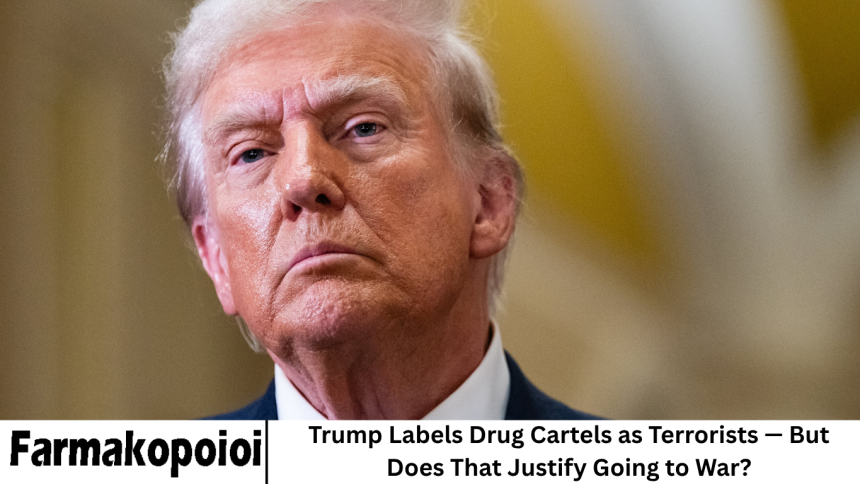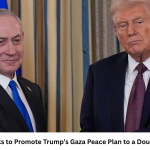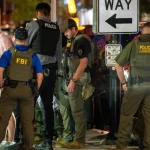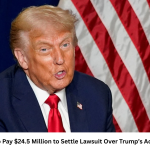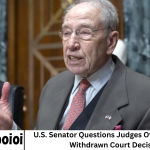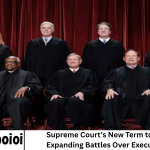Former U.S. President Donald Trump has once again stirred up heated debate with his declaration that Mexican drug cartels should be labeled as “terrorist organizations.” His statement has reignited an old but highly charged discussion about how the United States should deal with violent cartels responsible for drug trafficking.
- The Background: Trump’s Renewed Tough Talk on Cartels
- What Does It Mean to Label an Organization as a Terrorist Group?
- The Legal Dilemma: Terrorism vs. Organized Crime
- Mexico’s Strong Opposition
- Military Intervention: A Dangerous Precedent
- The War on Drugs: Lessons from the Past
- Economic and Political Motivations Behind Trump’s Proposal
- Diplomatic Fallout: What Could Happen if the U.S. Acts Unilaterally
- Alternative Approaches: Beyond Militarization
- The Moral Question: When Does Violence Justify Violence?
- Public Opinion: A Divided America
- Frequently Asked Question
- Conclusion
Trump’s stance — while not entirely new — signals a more aggressive approach to combating organized crime networks that have long plagued North America. But the critical question remains: Would labeling these cartels as terrorists justify military intervention or even a war-like response?
To fully understand the potential consequences of such a move, it’s essential to look at the historical context, legal implications, diplomatic consequences, and moral debates surrounding this controversial proposal.
More Read: Authorities Find No Proof That State Judge’s Home Fire Was Deliberate
The Background: Trump’s Renewed Tough Talk on Cartels
Donald Trump has consistently positioned himself as a hardliner on issues of crime and border security. During his presidency, and now once again in his political comeback efforts, Trump has called for decisive action against what he describes as “narco-terrorists” operating just south of the U.S. border.
His argument is simple: drug cartels are not mere criminal organizations; they operate with military precision, control vast territories, and inflict mass casualties through violence and the trafficking of deadly narcotics like fentanyl. To him, that fits the profile of terrorism.
In his words, “These cartels are poisoning our people and destabilizing our neighbor. They are terrorists, and we should treat them as such.”
This statement resonates with many Americans who see the fentanyl crisis and cross-border violence as an existential threat. However, labeling cartels as terrorists is not a simple act of rhetoric — it has far-reaching implications in law, diplomacy, and international security.
What Does It Mean to Label an Organization as a Terrorist Group?
Under U.S. law, the State Department designates groups as Foreign Terrorist Organizations (FTOs) if they meet three main criteria:
- The group is foreign-based.
- It engages in terrorism or terrorist activity.
- The activity threatens the security of U.S. nationals or the national defense, foreign relations, or economic interests of the United States.
Designating a group as an FTO carries serious consequences. It becomes illegal for any U.S. citizen to provide material support to the organization, its assets are frozen, and its members can face harsh penalties if they enter or operate within U.S. territory.
If Mexican cartels were labeled as FTOs, the U.S. government could theoretically justify military operations against them, similar to campaigns against ISIS or Al-Qaeda. But the key issue is whether cartels — motivated by profit rather than ideology — truly fit the legal and moral definition of a terrorist organization.
The Legal Dilemma: Terrorism vs. Organized Crime
While cartels commit acts of extreme violence, experts argue that their motives differ from traditional terrorist groups. Terrorist organizations generally pursue political, religious, or ideological goals — such as overthrowing a government or spreading a specific belief system.
Cartels, on the other hand, are profit-driven enterprises. Their use of terror is primarily a tool of business — intimidation, control, and deterrence. They kill not to make political statements, but to protect their operations.
Labeling them as terrorists could blur the line between criminal justice and national security frameworks. It could also set a dangerous precedent, allowing the U.S. government to expand its military powers into areas traditionally handled by law enforcement.
For instance, if cartels are labeled as terrorists, then anyone tangentially connected — such as financial intermediaries, local officials, or even residents coerced into cooperation — might be treated as aiding terrorism. This could create serious human rights and diplomatic complications.
Mexico’s Strong Opposition
Perhaps the most significant barrier to Trump’s proposal is Mexico’s government. President Andrés Manuel López Obrador (AMLO) has repeatedly condemned any notion of U.S. military intervention on Mexican soil, calling it a violation of sovereignty.
He has warned that labeling cartels as terrorists could “open the door to foreign troops entering our territory,” something Mexico’s constitution fiercely prohibits. AMLO insists that Mexico’s drug violence must be addressed through domestic reform, economic opportunity, and bilateral cooperation — not foreign force.
Diplomatically, such a move could strain one of America’s most critical relationships. The U.S. and Mexico are major trade partners and allies in immigration, border control, and regional stability.
Any sign of unilateral U.S. military action could trigger a political crisis, destabilize Mexico, and even backfire by strengthening anti-American sentiment.
Military Intervention: A Dangerous Precedent
If the U.S. were to use military force against cartels, it would mark a drastic escalation in the War on Drugs — effectively turning it into a War on Cartels. Some conservative strategists support this idea, suggesting that drone strikes or special operations could eliminate key cartel figures and dismantle drug trafficking routes.
They argue that since cartels have caused tens of thousands of American deaths through fentanyl overdoses, the U.S. has the right to act in self-defense.
However, history offers sobering lessons. The U.S. military’s involvement in foreign conflicts — from Afghanistan to Iraq — has shown that defeating decentralized, profit-motivated enemies is far more complicated than eliminating ideological extremists.
Cartels are deeply embedded in civilian communities and political systems. Military strikes could cause civilian casualties, diplomatic fallout, and even increase violence by destabilizing existing power structures within Mexico.
The War on Drugs: Lessons from the Past
The idea of using military power to fight narcotics isn’t new. The U.S. has been waging a “War on Drugs” since the 1970s, spending over $1 trillion to combat drug production, smuggling, and consumption.
Despite these efforts, drug use has remained high, new synthetic drugs have emerged, and cartels have grown more powerful and sophisticated. Experts warn that declaring cartels as terrorists might repeat old mistakes — focusing on militarization rather than prevention, education, and economic cooperation.
A 2023 RAND Corporation report concluded that “military approaches to drug control tend to displace, not eliminate, criminal activity,” as cartels adapt, relocate, and diversify.
Thus, while Trump’s proposal may appear decisive, it could deepen a failed policy model rather than fix it.
Economic and Political Motivations Behind Trump’s Proposal
Critics argue that Trump’s push to label cartels as terrorists may be as much about politics as policy.
It appeals to his base by portraying him as tough on crime and immigration while blaming Mexico for America’s drug crisis. It also fits into his broader “America First” narrative — portraying foreign actors as threats and justifying aggressive action to defend U.S. borders.
However, some analysts warn that such rhetoric oversimplifies complex issues like drug addiction, corruption, and global supply chains. While cartels are indeed dangerous, the demand for drugs — driven by domestic U.S. factors — remains a major part of the problem.
Without addressing the root causes of addiction and drug demand, any external military action is unlikely to produce lasting change.
Diplomatic Fallout: What Could Happen if the U.S. Acts Unilaterally
Should the U.S. proceed to label cartels as terrorist organizations without Mexico’s consent, several consequences could follow:
- Severe Diplomatic Strain: Mexico could suspend security cooperation or recall its ambassador.
- Trade Disruptions: The U.S.-Mexico-Canada Agreement (USMCA) could be politically jeopardized.
- Border Tensions: Increased militarization might lead to humanitarian crises at the border.
- Regional Instability: Neighboring Latin American countries could perceive the move as U.S. imperialism.
- Retaliation Risks: Cartels might target American citizens or facilities in Mexico, escalating the violence.
Thus, while Trump’s rhetoric appeals to a sense of national defense, its real-world consequences could be explosive.
Alternative Approaches: Beyond Militarization
Several policy experts propose more balanced strategies to combat cartel influence without invoking the term “terrorism.” These include:
- Intelligence and Financial Cooperation: Strengthening intelligence sharing and targeting the financial networks that sustain cartels.
- Border Security Technology: Using AI, drones, and data analytics to intercept drugs at the border.
- Economic Development in Mexico: Supporting job creation, education, and infrastructure in regions dominated by cartels.
- Addiction Treatment Programs: Addressing the U.S. demand side through rehabilitation and public health initiatives.
- Extradition and Legal Cooperation: Enhancing joint law enforcement operations rather than unilateral military strikes.
These approaches aim to dismantle cartels from the inside out, focusing on long-term stability rather than short-term aggression.
The Moral Question: When Does Violence Justify Violence?
At its core, the debate over Trump’s proposal raises a profound ethical question: Is it morally acceptable to wage war against criminal organizations if they are causing widespread death and suffering?
Supporters argue yes — that the fentanyl epidemic has become a form of chemical warfare against the American people, and drastic measures are justified. Opponents counter that war would only multiply suffering, drawing innocent civilians into harm’s way and undermining international law.
As history shows, violence against violence rarely produces peace. Instead, it breeds cycles of retribution and mistrust.
Public Opinion: A Divided America
Polling suggests that many Americans support stronger action against cartels but remain divided on whether to use military force. A 2024 Pew Research survey found that 58% of Americans favor designating cartels as terrorist organizations, while only 37% support direct military action.
The divide reflects a broader uncertainty — Americans want safety and accountability, but they also fear the costs and chaos of another foreign intervention.
Frequently Asked Question
Why does Trump want to label Mexican drug cartels as terrorists?
Trump argues that cartels cause mass death in the U.S. through fentanyl trafficking and brutal violence, which he sees as acts of terrorism. He believes labeling them as terrorists would give the U.S. more legal power to combat them aggressively.
What would happen if cartels were designated as terrorist organizations?
The U.S. could freeze their assets, prosecute anyone supporting them, and even justify military strikes abroad. However, such action could strain U.S.-Mexico relations and lead to legal and diplomatic backlash.
How does Mexico’s government view this proposal?
Mexico strongly opposes it. President López Obrador has stated that any foreign military intervention would violate Mexican sovereignty and could damage bilateral relations.
Are cartels legally considered terrorists under U.S. law?
Currently, no. While they use violence and fear, cartels are considered transnational criminal organizations (TCOs) rather than terrorists because their main goal is profit, not ideology.
Would military action against cartels be effective?
Experts are skeptical. Military interventions often disrupt but don’t dismantle organized crime networks. They can also lead to civilian casualties and worsen instability in affected regions.
What alternatives exist to labeling cartels as terrorists?
Alternatives include improving intelligence cooperation with Mexico, targeting financial systems, enhancing border technology, reducing U.S. drug demand, and promoting social programs in cartel-dominated regions.
Could Trump’s proposal lead to war with Mexico?
While an outright war is unlikely, unilateral U.S. military actions could trigger severe diplomatic conflict, public outrage in Mexico, and violent retaliation from cartels — effectively creating a shadow war across the border.
Conclusion
Trump’s proposal to label Mexican drug cartels as terrorists touches the deepest nerves of U.S. national identity — the tension between security and restraint, justice and diplomacy. On one hand, the devastation caused by cartels — especially through the fentanyl epidemic — demands urgent action.
Labeling cartels as terrorists might satisfy political urgency but risks legal confusion, diplomatic fallout, and moral compromise. The U.S. must decide whether to confront the drug crisis through militarization or reform, through force or partnership.


